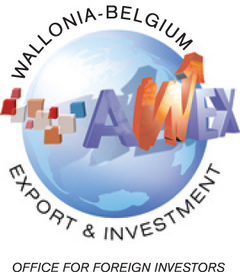Dépêches
Emissions Down, Economic Growth up in Wallonia, Belgium
Dépèche transmise le 5 août 2009 par Business Wire

Emissions Down, Economic Growth up in Wallonia, Belgium
TRAVERSE CITY, Mich.--(BUSINESS WIRE)--Belgium’s Wallonia region achieved a major reduction in carbon emissions last year while posting an average annual economic growth rate of more than eight percent.
The region recorded a 16.9 percent reduction in carbon emissions in 2008, more than double the 7.5 percent target set by European Union, according to Jean-Pierre Vasaune, North American director of business development for Wallonia’s Office for Foreign Investors.
Vasaune said Wallonia also has seen an average annual growth rate of 8.4 percent over the past several years to earn a reputation as “one of Europe’s most dynamic regions.”
With attractive bonus programs and agreements with various industrial sectors to reduce energy consumption, he added that Wallonia is on track to reach the EU’s CO2-reduction target of 20 percent by 2020.
The region recently unveiled a plan to require new homes to be of sustainable design or eco-passive – homes that reduce energy use to almost zero by relying on insulation and alternative energy sources such as solar power.
“In Wallonia, we are establishing energy efficiency as the norm rather than the exception,” Vasaune said. “We are making great strides in reducing carbon emissions, and our aggressive plans for further improving the region’s economy have proven to be highly successful as well.”
The region’s economic development programs have attracted major investments from companies such as Google, Microsoft, Baxter, GlaxoSmithKline, Doosan of Korea, Johnson & Johnson and AMI Metals. Last year “Invest in Belgium” – the region’s business development agency – helped more than 122 foreign companies locate facilities in Wallonia resulting in thousands of new jobs.
The region is a major automotive production center and a leader in areas such as life sciences, biotechnology, aerospace, agricultural products, mechanical engineering and advanced materials.
Wallonia’s more than 250 automotive supplier plants provide components to major automakers including Daimler, Ford, General Motors, Renault, Toyota, Volkswagen and Volvo. Mechanical engineering and advanced materials are the region’s largest business sectors with nearly 3,000 companies and 60,000 workers accounting for 40 percent of the region’s manufacturing jobs.
Biotechnology and life sciences are rapidly growing sectors as well. The French-speaking region in southern Belgium is the home to more than 80 biotechnology companies and 300 private and public research-and-development centers employing more than 11,000 researchers. The world’s first measles, rubella, hepatitis B, meningitis and cervical cancer vaccines were developed in Wallonia.
Vasaune believes a skilled and multi-lingual workforce is a key factor prompting businesses to locate in Wallonia. He noted that a recent study indicates that workers in Wallonia are 20 percent more productive than their counterparts throughout Europe.
Another major appeal for foreign companies is Belgium’s central location in Europe. More than 140 million European major-market consumers can be reached within a radius of 300 miles from its borders.
Despite a global recession, Brussels South Charleroi airport -- the most accessible in Belgium – experienced a 40 percent increase in passenger traffic in June compared to the same period a year ago, according to Vasaune. Routes added by existing carriers such as Ryanair and new business from companies such as Jetairfly, Air Arabia and “restart” FlyOnAir, have helped double the number of operational routes from the airport in recent months.
“The Wallonia region offers special incentives to investments that benefit the environment, promote renewable energies or support R&D programs,” he added. “European Community initiatives to promote biofuels promise to generate a number of jobs within our region.”
Belgium’s first bioethanol plant officially opened this spring near Liege. The facility processes flour and beetroot syrup to produce fuel and relies on recycled energy to reduce carbon emissions by up to 70 percent. Approximately 800,000 tons of flour and 400,000 tons of beetroot will be used to produce 300,000 liters of bioethanol annually.
The Wallonia region of Belgium is a European leader in productivity, innovation and quality of research, drawing upon an educational system with 130 colleges of higher education and nine university centers. The region benefits from excellent industrial relations, with a percentage of working hours lost due to labor disputes significantly below other major European industrial nations.
“We are at the vanguard of European technology and stand at the center of political and economic decision-making in Europe, but we preserve our character and traditions,” Vasaune pointed out. “We can proudly say that Belgium is truly a location ‘where Europe works.’"
Further information is available on the Internet at: www.investinwallonia.com.
- 10:42 Les Flying Bulls feront le show dans les airs au Red Bull Motormania
- 09:27Meeting Cerny-La Ferté-Alais 2025 : programme des vols avec horaires pour le samedi
- 08:56 Radia présente le WindRunner pour la première fois en France au Salon du Bourget
- 08:40 Air Niugini divulgue une commande de deux nouveaux avions A220
- 05/06 Air Transat prolonge sa liaison Bordeaux - Montréal à l’hiver 2025-2026
- 05/06 Emirates et Air Mauritius renouvellent leur partenariat
- 05/06 Vietjet a commandé des Airbus A330neo supplémentaires
- 05/06 United Airlines inaugure une nouvelle liaison saisonnière sans escale entre Nice et Washington D.C.
- 05/06 easyJet inaugure des nouvelles liaisons vers l'Italie
- 04/06 Cathay Pacific relance sa liaison vers Adélaïde
- 04/06 Nesher Aviation commande des Tecnam P-Mentor
- 04/06 Airbus livre le premier A321XLR motorisé par Pratt & Whitney à Wizz Air
- 04/06 Finnair étoffe son programme hivernal
- 04/06 Le premier Bombardier Global 8000 de série effectue son vol inaugural
- 04/06 Le Groupe Qatar Airways annonce les meilleurs résultats financiers de son histoire
- 04/06 Corsair signe un partenariat avec Hertz
- 01/06Incident au sol d'un Spitfire à Biscarrosse
- 31/05Meeting Cerny-La Ferté-Alais 2025 : et si vous voliez en DC-3
- 31/05 Le deuxième prototype du Cessna Citation CJ4 Gen3 prend son envol avec succès
- 31/05 Textron Aviation annonce sa venue au salon du Bourget 2025







